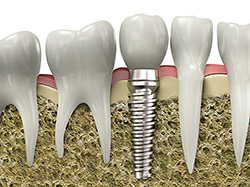Can Poor Oral Health Cause Alzheimer's Disease?
May 1st, 2023
Numerous studies are pointing to the correlation of Periodontal disease and Alzheimer’s.
What Is Periodontal Disease?
Periodontal disease is chronic inflammation of the gums and bone due to infection and inflammation. Harmful bacteria such as P. Gingivalis form as a result underneath the gums causing irreversible bone loss.
Gingivitis is the precursor to periodontal disease and is reversible through good oral hygiene habits. It is important to keep up with your dental hygiene visits to catch it early.
According to the CDC:
- 47.2% of adults aged 30 years and older have some form of periodontal disease.
- Periodontal disease increases with age, 70.1% of adults 65 years and older have periodontal disease.
So How May Periodontal Disease Contribute To Alzheimer’s?
According to an article in the Journal of Alzheimer's Disease published in 2023, the presence of harmful bacteria from Periodontal disease is associated with Alzheimer's Disease.
Many of these bacteria can leave our gums and travel through our bloodstream to our brains. They can also cause the production of inflammation markers and amyloid proteins.
These proteins may cause inflammation of brain cells which may contribute to brain cell death. This destruction of neurons could be the mechanism for memory loss in Alzheimer's.

A study performed in 2022 by Tuft's University School of Dental Medicine found that a certain bacteria in periodontal disease, F. Nucleatum, may contribute to Alzheimer's. Dr. Jake Junkun Chen professor of periodontology stated, “In this study, our lab is the first to find that Fusobacterium nucleatum can generate systemic inflammation and even infiltrate nervous system tissues and exacerbate the signs and symptoms of Alzheimer’s disease."
Back in 2016, The University of Central Lancashire School of Medicine and Dentistry initiated a study that found the first correlation between oral bacteria and Alzheimer's disease. They studied the brain samples of dementia patients compared to those without dementia, and noticed a higher presence of the P. gingivalis bacteria in the brains of those with dementia.
Dr. Sim K. Singhrao, a Senior Research Fellow involved in this study stated: “We are working on the theory that when the brain is repeatedly exposed to bacteria and/or their debris from our gums, subsequent immune responses may lead to nerve cell death and possibly memory loss. Thus, continued visits to dental hygiene professionals throughout one’s life may be more important than currently envisaged with inferences for health outside of the mouth only.”
Finding P. gingivalis and other strains of bacteria in our bloodstream may become a risk factor for developing dementia in the future.




 Website Powered by Sesame 24-7™
Website Powered by Sesame 24-7™